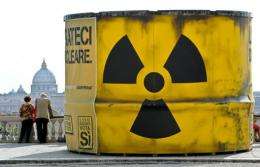File photo shows a giant mock nuclear waste barrel in Rome on June 10, 2011. The global upsurge in the use of nuclear power in countries such as China, Russia and Britain must be accompanied by a greater focus on security and the management of nuclear waste, a report said Thursday.
The global upsurge in the use of nuclear power in countries such as China, Russia and Britain must be accompanied by a greater focus on security and the management of nuclear waste, a report said Thursday.
In the wake of the Fukushima disaster, the respected Royal Society called for a World Nuclear Forum that embraces globalisation and overcomes separate national approaches to nuclear safety.
Its report said global regulation for security and non-proliferation "is 50 years out of date and needs to address the changing geography of nuclear power as well as a fully nationalised nuclear industry".
"Fukushima has shown that we cannot be complacent about nuclear safety; the same attitude needs to apply to security and non-proliferation," it said.
A global forum would allow business leaders and government chiefs to explore the future development of the nuclear industry, the report added.
The Royal Society said that before the earthquake and tsunami hit Japan in March and caused explosions and leaks at the Fukushima plant, the nuclear industry had foreseen a period of global expansion.
"Post-Fukushima, this may still remain valid, although the rate at which nuclear power expands globally may slow," it said.
Britain's environment minister Chris Huhne gave the green light on Tuesday for the expansion of its nuclear industry after a safety review concluded there was no grounds for Britain to curtail the use of nuclear power.
But the Royal Society accused Britain of operating a "short-sighted" approach to planning and research and urged it to avoid "burdening future generations with a legacy of spent nuclear fuel".
It called for the construction of a new Mox nuclear fuel plant after the closure of Britain's only existing plant at Sellafield in August.
In contrast to Britain, Germany has decided to phase out nuclear energy by 2022 in the wake of the Fukushima disaster.
(c) 2011 AFP
























